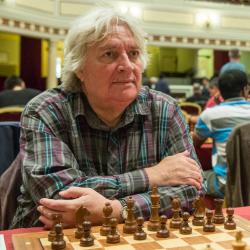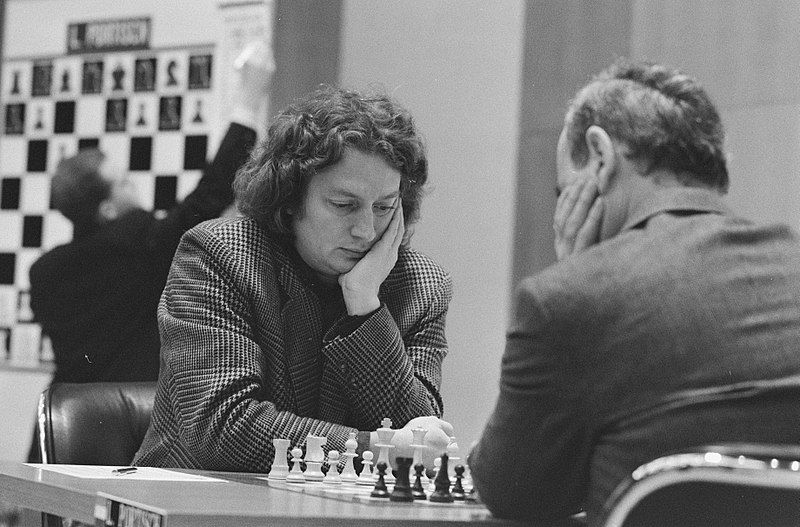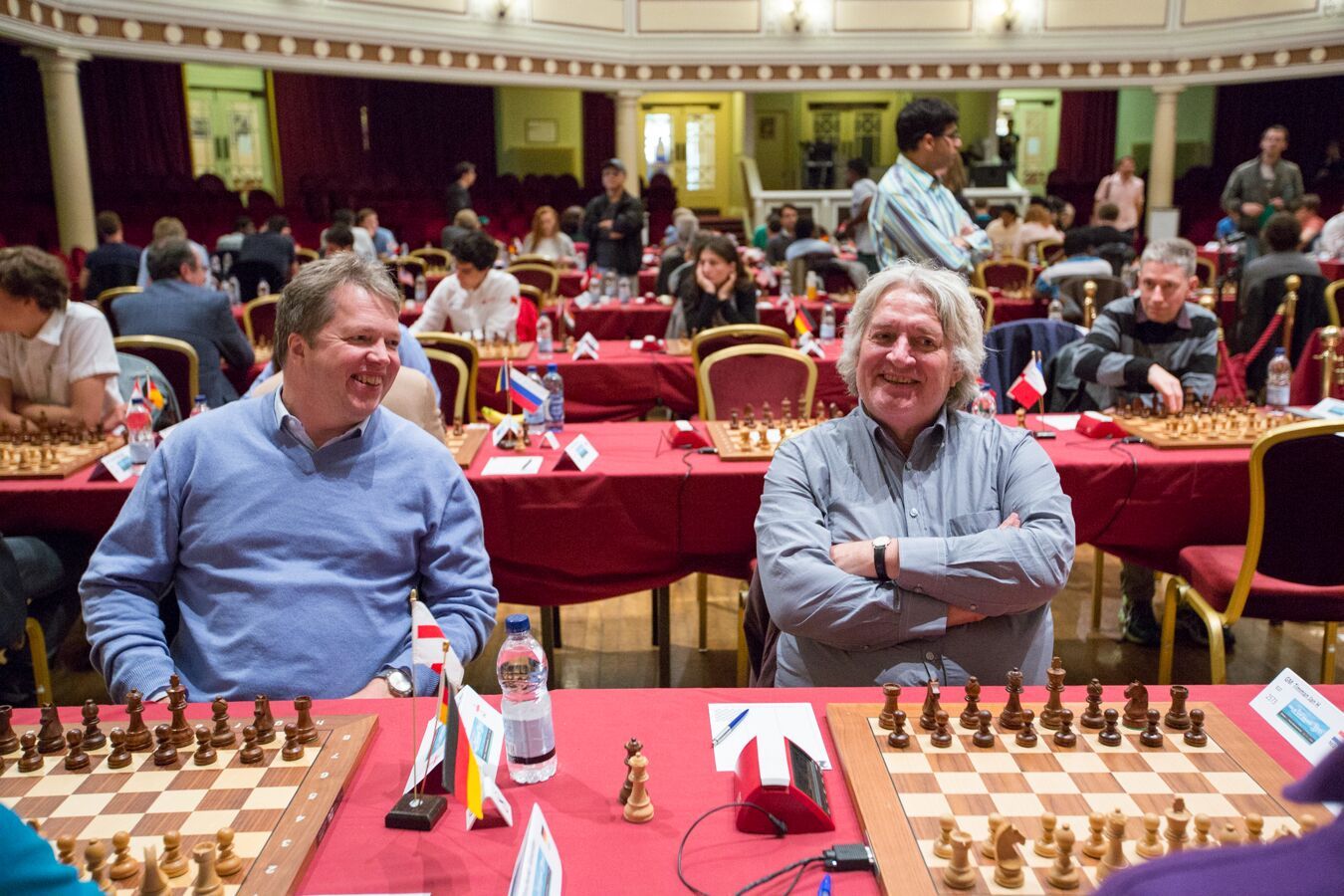GM Jan H Timman

Bio
Jan Timman (1951- ), one of Western Europe’s best chess players, is a top-flight Dutch grandmaster and was nine-time chess champion of the Netherlands between 1974 and 1996. He was the challenger to FIDE’s world championship in 1993.
Early Life And Career (1951-74)
When Jan Timman was born in the Dutch capital of Amsterdam in 1951, he was already connected to the Netherlands’ world chess champion, GM Max Euwe, who had taught Timman’s mother when she was in grade school.
Timman was quite good in his youth, finishing third in the World Junior Championship in 1967 at the age of 15. By the time he was 20, he had made IM, doing so in 1971.
Breakout (1974-87)
The year 1974 was a great one for Timman. He became only the third Dutch player to achieve the grandmaster title, following Euwe and Jan Hein Donner. That year Timman also won the Dutch Chess Championship, his first. His second and third followed immediately in 1975 and ’76. In fact, Timman won first place outright six times and a share of first for a seventh championship in just ten years from 1974 to 1983. He took his eighth in 1987.

Unsurprisingly, Timman had world champion prospects. In 1979 he played the Interzonal tournament for the first time, taking him one step away from the Candidates. At Rio de Janeiro, however, just the top three advanced, and Timman finished half a point outside them. Despite finishing 1½ points ahead of fifth compared to just the half-point outside of third, his chances at the 1981 World Championship were ended.
By 1982 Timman was at his peak. Only GM Anatoly Karpov, the reigning world champion, was higher on the FIDE rating list. But Timman beat Karpov at the 1982 Mar del Plata tournament, the whole of which Timman won as well by a whopping 1½ points.
Unfortunately, Timman once again was stopped in the Interzonal, finishing two points away from qualifying at Las Palmas.
Candidate (1987-96)
Timman’s Interzonal disappointments did not last long, however. In 1985 he broke through, winning at Taxco in June. That year he also won the Wijk aan Zee tournament, and he was the last player from the host country to win that prestigious event until 2021.
The Candidates, which lasted 17 months from October 1985 to March 1987, had a complex format: four players advanced out of a 16-player single round-robin to a short knockout tournament, and the winner would play Karpov for the right to challenge GM Garry Kasparov.
Timman finished tied for fourth in the round-robin with a score of +4 -2 =9, for 8½ points out of 15. For his spot in the knockout round, Timman would have to fight off the former world champion GM Mikhail Tal in a playoff. (Just on the outside looking in, by half a point, was another former champ, GM Boris Spassky. Timman won their tournament matchup as Black in a 98-move marathon.) Fortunately for Timman, he needed only to draw the six-game match because he had won more games than Tal in the round-robin. And that is what happened, each player winning a single game.
Of the four to reach the knockout stage (five counting Karpov), Timman was the only non-Soviet player. Perhaps nothing better demonstrated his ability to stand out as a western chess player in the particularly Soviet-dominated 1980s.
Facing round-robin leader GM Artur Yusupov in Tilburg in Timman’s home country, the Dutchman fell 6-3. Yusupov would lose to GM Andrei Sokolov, who in turn was defeated by Karpov, who lost the championship match to Kasparov.
Timman’s performance in the 1987 Candidates earned him a bid in the 1990 Candidates, where he advanced all the way to the finals by beating GM Valery Salov (USSR), GM Lajos Portisch (Hungary), and GM Jon Speelman (England). Facing Karpov in the final in Kuala Lumpur in Malaysia, however, Timman fell quietly by a score of 6½-2½.
Timman’s overall performance in these cycles and other regular events led to him reaching his peak rating of 2680 in 1990. The next year, in the Immopar rapid tournament at Paris, he defeated a murderer’s row of GM Gata Kamsky, Karpov, GM Viswanathan Anand, and Kasparov to claim first place.
Once again automatically a candidate for the 1993 cycle, Timman suffered the same fate as the cycle before and lost in the finals. He advanced there by defeating GM Robert Huebner (Germany), ex-Soviet GM Viktor Korchnoi (Switzerland), and the now ex-Soviet Yusupov who represented Germany.

This time, however, Timman lost the final to GM Nigel Short instead of Karpov. When Kasparov and Short split from FIDE, the world chess organization staged its own championship between Karpov and Timman, the final two players whom Short had eliminated.
Timman, who didn’t win a single game as White, was again soundly defeated by Karpov. After 16 rounds, Karpov had won six games to Timman’s one (game two as Black). A draw in game 19 meant Timman would need to win five straight games to tie the match. After Timman won game 20, a draw in the 21st game gave Karpov the title.
Later Career (1996-Present)
Timman never came so close to a title again and was also one of many players who lost opportunities at an undisputed world title from 1993 to 2006. In FIDE’s next Candidates in 1996, Timman fell to Salov in the quarterfinals. The year 1996 was still a good one for Timman, as he won his ninth Dutch championship then, his last to date.
Timman also played in FIDE’s 64-player championship tournaments in 1998 and 1999, losing in the third round in 1998 and the second in 1999. (The formats were slightly different, with Karpov seeded into the final in 1998 and then refusing to play in 1999 that resulted in FIDE’s first outright knockout championship.)

Timman remains an active player, most recently as one of several grandmasters in the 360-player Xtracon Chess Open in 2019 in Denmark. He scored 6½ out of 10.
Timman, Karpov, Huebner, and GM Pedrag Nikolic played a tournament in 2020 that Nikolic won.
Legacy
Stylistically, Timman has been compared to Emanuel Lasker (by GM Raymond Keene) for his somewhat psychological approach to chess. In Timman’s case, this sometimes even means taking opponents head-on with their favorite openings, making his victories all the more demoralizing and impressive.
In addition to his success at the board, Timman has become a prolific chess author as well. His books include "Curacao 1962" (2005) about that controversial Candidates tournament, "Timman’s Titans" (2016) on the world champions of his lifetime, and "The Longest Game" (2018) about the Kasparov-Karpov championship matches, as well as a 2006 book on attacking and a 2012 book about endgames.
Timman was one of the Soviet-dominated era's strongest Western players. With Max Euwe, Timman is one of the two best players in Dutch chess history. (GM Anish Giri, who has played for the Netherlands since 2009, may by now be a third.)
With over two decades near the peak of chess, Timman is ultimately one of those players who can be described as among the very best to never become world champion.


